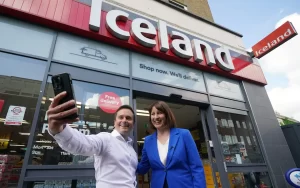Richard Walker, the head of Iceland Foods, has issued a stark warning to Labour, cautioning that a sudden increase in the minimum wage could lead to the bankruptcy of his supermarket chain.
Walker, who shifted his political allegiance from the Conservatives to Labour earlier this year, stressed that while it is “absolutely right” to improve working conditions and wages, any changes must be implemented gradually to avoid a catastrophic impact on businesses.
Labour, led by Deputy Prime Minister Angela Rayner, is planning a significant overhaul of workers’ rights, which includes proposals to increase the minimum wage, provide employees with protection from unfair dismissal from day one, and eliminate zero-hours contracts. These reforms are expected to be rolled out swiftly, with reports suggesting they could take effect as early as October 12.
Walker, however, has urged Labour to adopt a more cautious approach. “If Labour puts up the minimum wage and brings in day one rights, that’s fine, but it needs to be bled in slowly. If they turn around and say ‘the minimum wage is £15 now’, that would bankrupt us,” he warned.
He also addressed Labour’s stance on zero-hours contracts, acknowledging that while they might not be suitable for his business, they do serve a purpose for some workers who value flexibility. “Some people want them, they might be studying or want the flexibility. I don’t think it is as simple as being exploitative,” he said.
Despite his concerns, Walker remains optimistic that Labour is still open to dialogue with business leaders. He praised the accessibility of Labour’s cabinet members, particularly Chancellor Rachel Reeves, who he described as understanding the need for a balanced approach that doesn’t punish businesses unduly.
Walker’s relationship with the Conservative Party soured after he faced pushback during his bid to become a Tory MP, leading him to quit the party last year. He has since criticised the Conservatives for being “out of touch” and for failing to conserve key aspects of British life, including the environment and the economy.
The shift in Walker’s political stance comes at a time when Iceland is navigating significant financial challenges. The supermarket chain has struggled with high levels of borrowing and rising energy costs, although recent improvements in its financial health have led to a more positive outlook from credit rating agencies. Iceland has also announced plans to expand its “food warehouse” stores, with the aim of opening 30 new locations each year.
Looking ahead, Walker hopes that Labour’s approach to business and workers’ rights will strike the right balance, ensuring that businesses like Iceland can thrive while also providing fair treatment to employees. “Labour correctly diagnosed the problem in terms of a chronic lack of growth,” he said. “And if they can free up things like the planning laws that will help business, but it will also help the worker.”
Walker’s comments highlight the delicate balance Labour must navigate as it seeks to position itself as both the party of business and the party of workers. As he puts it, “It’s absolutely right to give workers the best deal possible. It just needs to be managed and communicated the right way with business.”
Read more:
Iceland boss warns Labour of potential bankruptcy from ‘shock’ minimum wage rise

